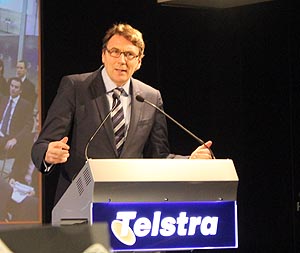Telstra invests $600m in VoIP upgrades

Telstra has announced a $600 million Quality-of-Service upgrade to 1600 exchanges across Australia as part of a five-year plan to help small businesses switch to Voice over IP (VoIP) phone services.

David Thodey(Credit: Josh Taylor/ZDNet Australia)
The upgrades to Quality-of-Service (QoS) will allow businesses using the Digital Business package to have quality VoIP calls over their Telstra ADSL2+ connection, Telstra said. The upgrades will start at exchanges in capital cities and are anticipated to be completed in September. The 1600 exchanges are expected to serve 90 per cent of Australian businesses.
The upgrades come as the telco's CEO David Thodey today announced its Digital Business package for small businesses together with the Federal Minister for Small Business, Nick Sherry.
Starting at $120 per month, the Digital Business package offers a basic ADSL2+ connection to businesses, which will be supplied with a Cisco Router and a Cisco digital phone, with all standard call costs included. The package includes Microsoft's Exchange Online facilities for remote email and calendar access, included as part of the T-suite hosted services provided by Telstra. Also included are Voice2Email messaging, unlimited access to MessageBank and a domain name for customers to set up a website.
Customers also have the option to pay an additional $15 per month to have their internet and voice connection automatically switch over to the Telstra NextG network should the ADSL connection fail.
"Often people say they want a cheaper price but what they're really saying is that they want more functionality at a more affordable price," Thodey said at the launch in Sydney today, adding that the Digital Business package would save small businesses an estimated $2400 per year in costs.
"That equates to more than a billion dollars in annual savings across the economy," Sherry added.
Telstra would not yet launch VoIP services to consumers, Thodey said, because he said that without the QoS upgrade, the technology didn't have the level of "quality or reliability" that the company was happy with.
"As we think the product's mature enough and can give all the reliability and also the technical backup we think the product needs, then we will bring it to market," he said. "We're a quality provider and we will always bring products to market when we think they're ready."
Thodey noted that competitors such as iiNet had their QoS embedded into the routers rather than the exchanges as Telstra had done. Thodey said that the need for the upgrades at the exchange was to ensure the quality of "end-to-end service".
When asked whether the exchange upgrades are relevant given the roll-out of the Federal Government's National Broadband Network (NBN) project, Thodey said that the company is still committed to delivering services over the copper while the NBN is being rolled out.
"We're still rolling out ADSL2+ and we will progressively do that, and depending on how the NBN schedule finalises out, we will just manage the two," he said. "The wonderful thing about Digital Business is that it is NBN-ready, so we can just flick it across when NBN turns up and, hey presto, it's still working."
Thodey said that the telco has made "great progress" in the negotiations over the $11 billion deal with NBN Co to lease the ducts and pipes and shut down its copper network and move customers onto the NBN. NBN Co CEO Mike Quigley said on Friday that the negotiations have entered the "final stages" but neither chief would commit to revealing when the deal would be finalised.
The official launch of the Digital Business product will be on 5 June; however, Telstra Business group managing director Deena Shiff says that the company is already taking orders from its website.